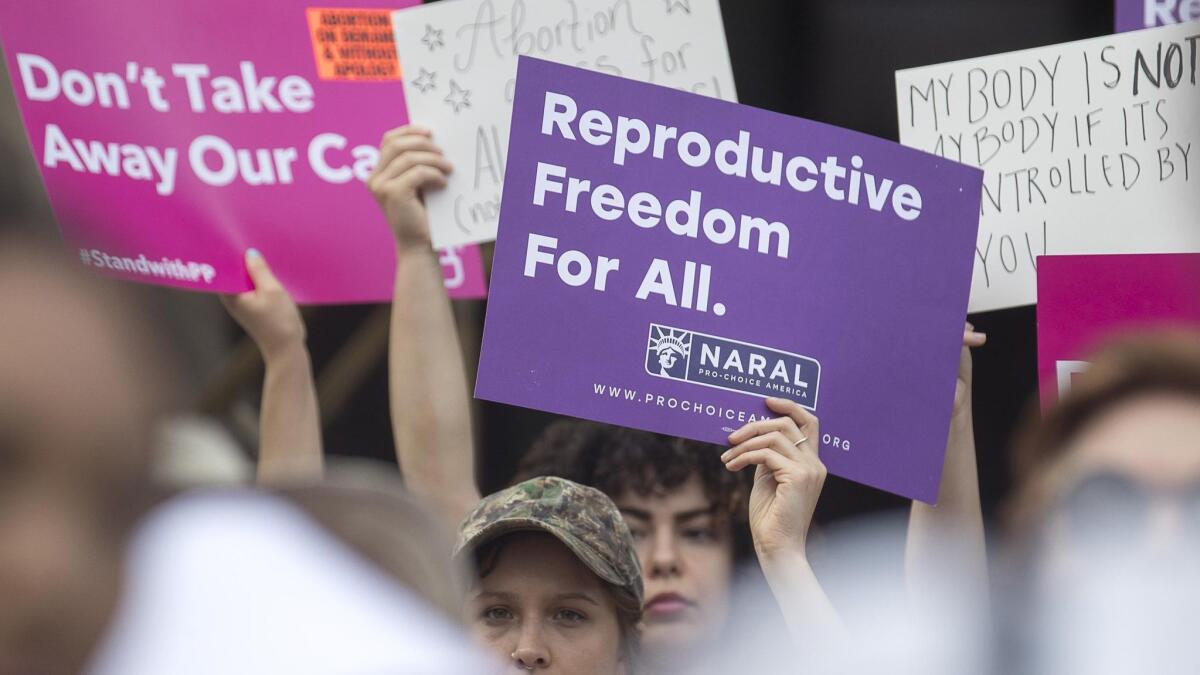Paying studios to make movies politicians like isn’t a ‘California value’

- Share via
California’s left-lurching Legislature has never been afraid to make businesses serve the state’s social goals — for example, by requiring them to put more women on their corporate boards, provide lactation rooms for nursing mothers and reveal what personal data they’re collecting on their customers. But now lawmakers are considering what would be a major step further: awarding subsidies to companies that express a point of view the Legislature favors.
That’s an appalling thought.
The bill in question, Assembly Bill 1442 by Assemblywoman Luz Rivas (D-North Hollywood), would offer an additional $50 million in tax credits to film and TV producers who locate their productions in California at least in part because of the restrictive abortion laws in other states. Subsidy applicants would have to submit “a narrative summary describing how the qualified taxpayer, and any relevant activities during the production period, shares California’s values with regard to women’s reproductive rights,” which would be a factor in the California Film Commission’s decisions about whom to fund.
Not to put too fine a point on it, but the bill’s title is the “Share Our Values Tax Credit.”
The Times’ editorial board blasted the proposal in May, arguing that it “smacks of bribing companies to boycott, and it opens the door for more tit-for-tat tax break wars among states.” Yet like a Timex watch, the proposal keeps ticking — it has passed one state Senate committee and awaits a vote Friday in another.
The issue here isn’t abortion rights, which are under sustained attack in multiple states to the east. It’s whether the state should decide whether someone should receive tax dollars based on his or her speech and opinions.
We’re looking at the flip side of the 1st Amendment coin. Not only is it constitutionally suspect for the government to restrict or compel legal speech, it’s constitutionally suspect for the government to discriminate against you because of the legal things you say. Such discrimination is illegal unless the government can show that it has a compelling state interest in doing so, and that its method is the least bad way to accomplish that goal.
There may be a compelling state interest in subsidizing film and TV production, given how intense and subsidy-driven the competition for these jobs has become among states. But what’s the compelling interest in subsidizing pro-abortion-rights producers? If the point of the subsidies is to attract the jobs being created, it doesn’t matter what the film or TV series is about, does it?
But don’t take my non-lawyerly word for it. Here’s what UCLA law professor and 1st Amendment expert Eugene Volokh had to say when I emailed him about the bill:
“Denying a grant or other benefit (including a tax credit) to a person or group based on its ideology is a clear 1st Amendment violation: The Court reaffirmed that just in 2013, in U.S. Agency for International Development vs. Alliance for Open Society International, when it struck down a policy that denied HIV-prevention grants to any organization ‘that does not have a policy explicitly opposing prostitution and sex trafficking.’”
Nor does it matter that the tax credit isn’t a guaranteed benefit, unlike, say, food stamps, Volokh wrote. As the Supreme Court put it colorfully in its 1958 decision in Speiser vs. Randall, “It cannot be gainsaid that a discriminatory denial of a tax exemption for engaging in speech is a limitation on free speech.”
You can’t ignore the malodorous precedent that would be set if AB 1442 were enacted. Lawmakers have always been tempted to use the tax code to affect behavior, and it makes sense in some cases to do that. The best example is the huge tax on cigarettes, which effectively deters smoking. But using the tax code to try to shape what people say and think is a giant step over the guardrail.
More to Read
A cure for the common opinion
Get thought-provoking perspectives with our weekly newsletter.
You may occasionally receive promotional content from the Los Angeles Times.










